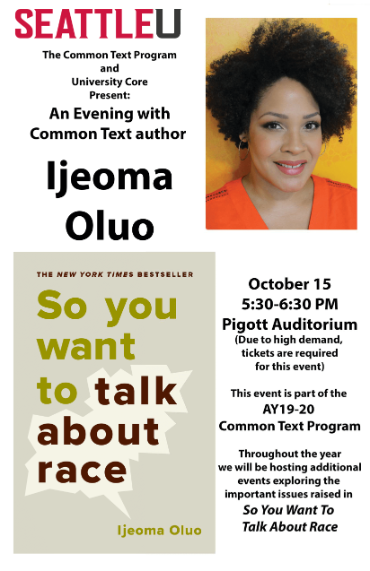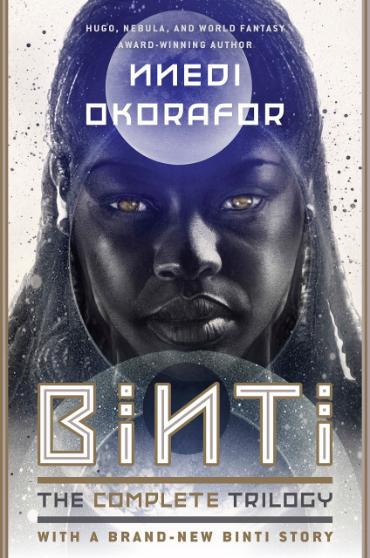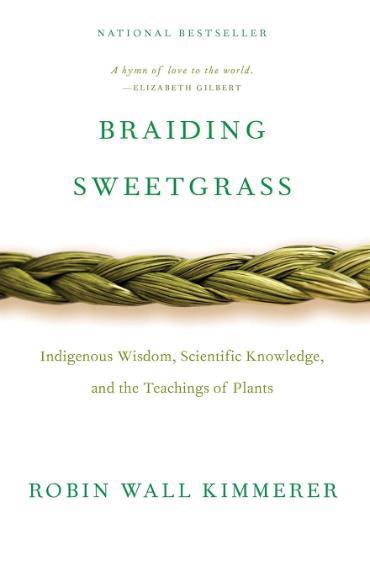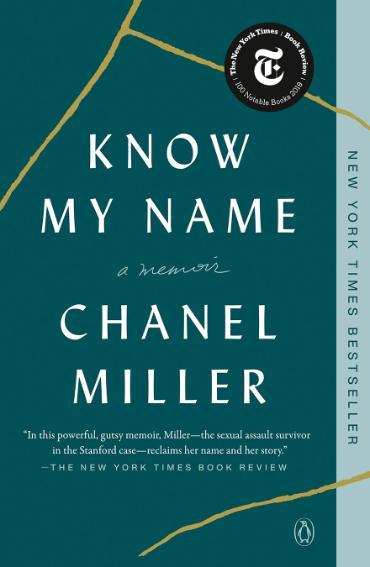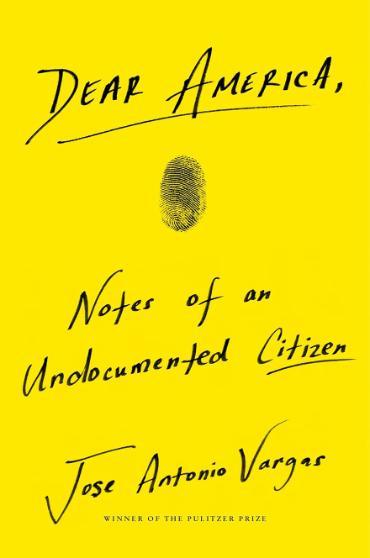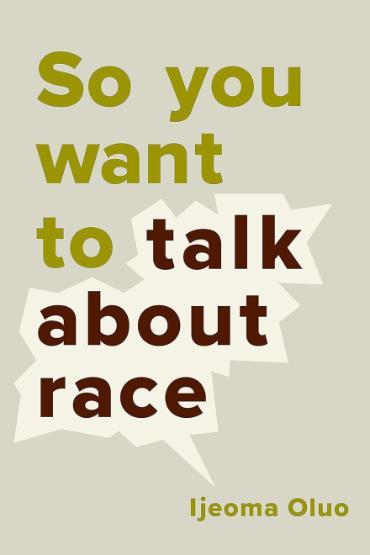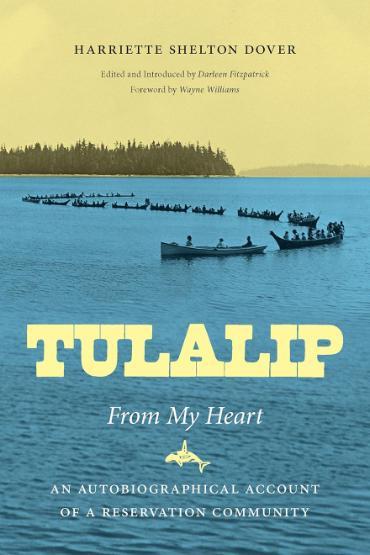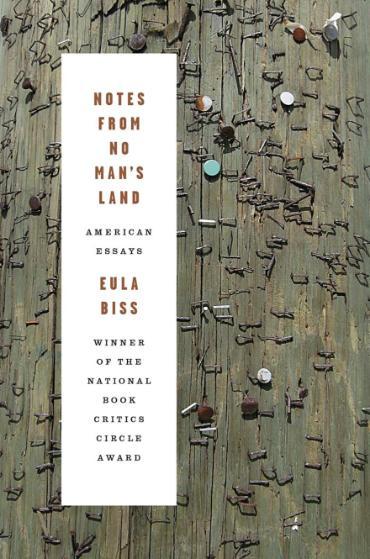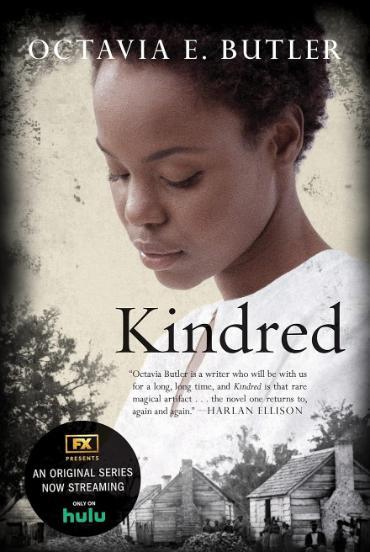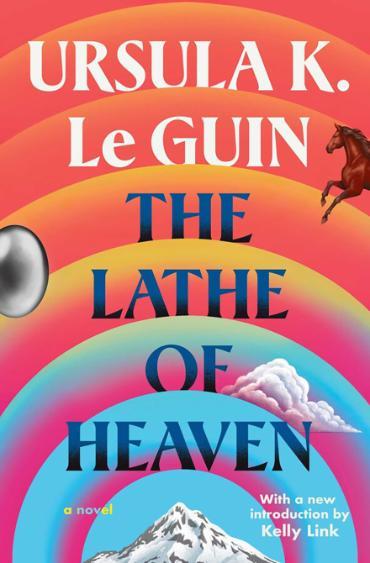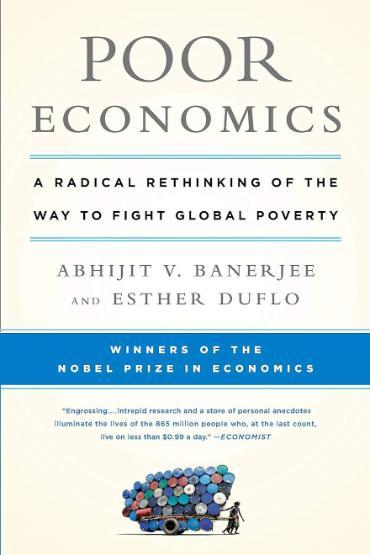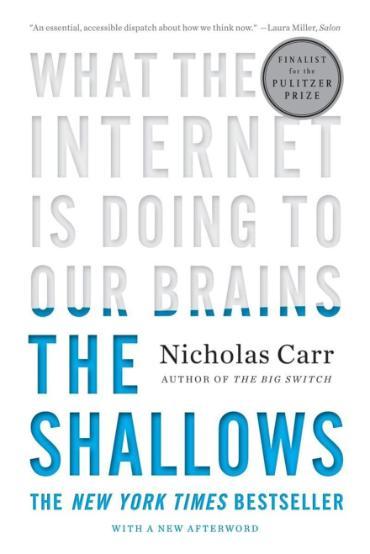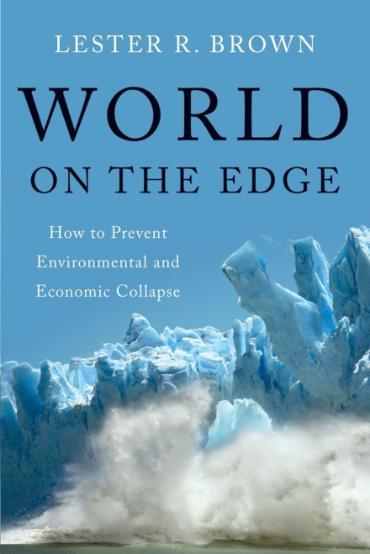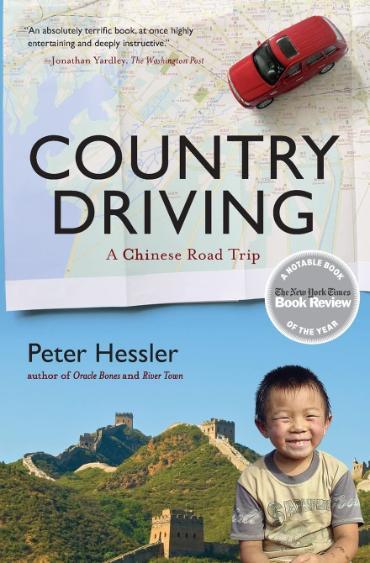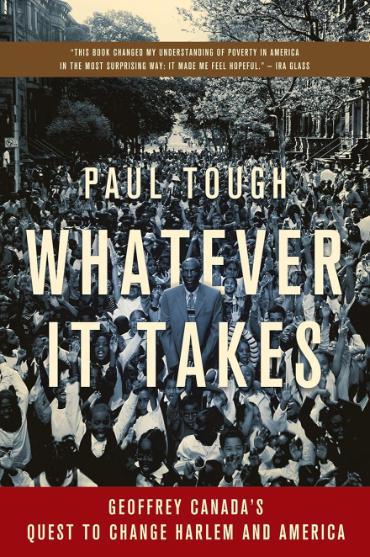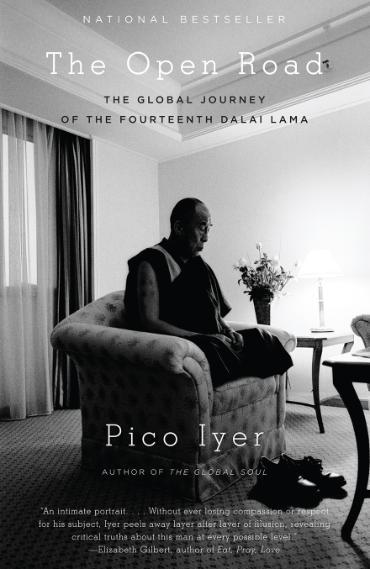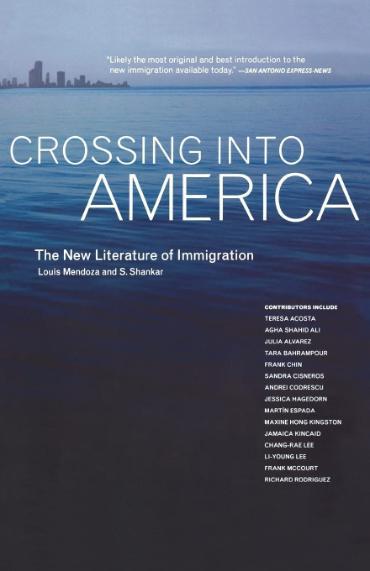Past Common Texts
Browse Seattle University's past common texts and explore their additional resources and past events.
- Academics
- University Core
- The Common Text
- Past Common Texts
2024
Nnedi Okorafor: Sci-fi stories that imagine a future Africa | TED
"My science fiction has different ancestors -- African ones," says writer Nnedi Okorafor. In between excerpts from her "Binti" series and her novel "Lagoon," Okorafor discusses the inspiration and roots of her work -- and how she opens strange doors through her Afrofuturist writing.
"Africanfuturism Defined" | Nnedi's Wahala Zone Blog
"Afrofuturism, Africanfuturism, and the Language of Black Speculative Literature" | Los Angeles Review of Books
Professor Hope Wabuke considers the future of Afrofuturism and Africanfuturism.
"The Story of the Astrolabe, the Original Smartphone" | Smithsonian Magazine
Prosperous times likely paved the way for this multifunctional device, conceptual ancestor to the iPhone 7.
Dr. Nnedi Okorafor's Campus Visit
Thursday, April 10, 2025 | 3:30 - 6:00 pm
Campion Ballroom
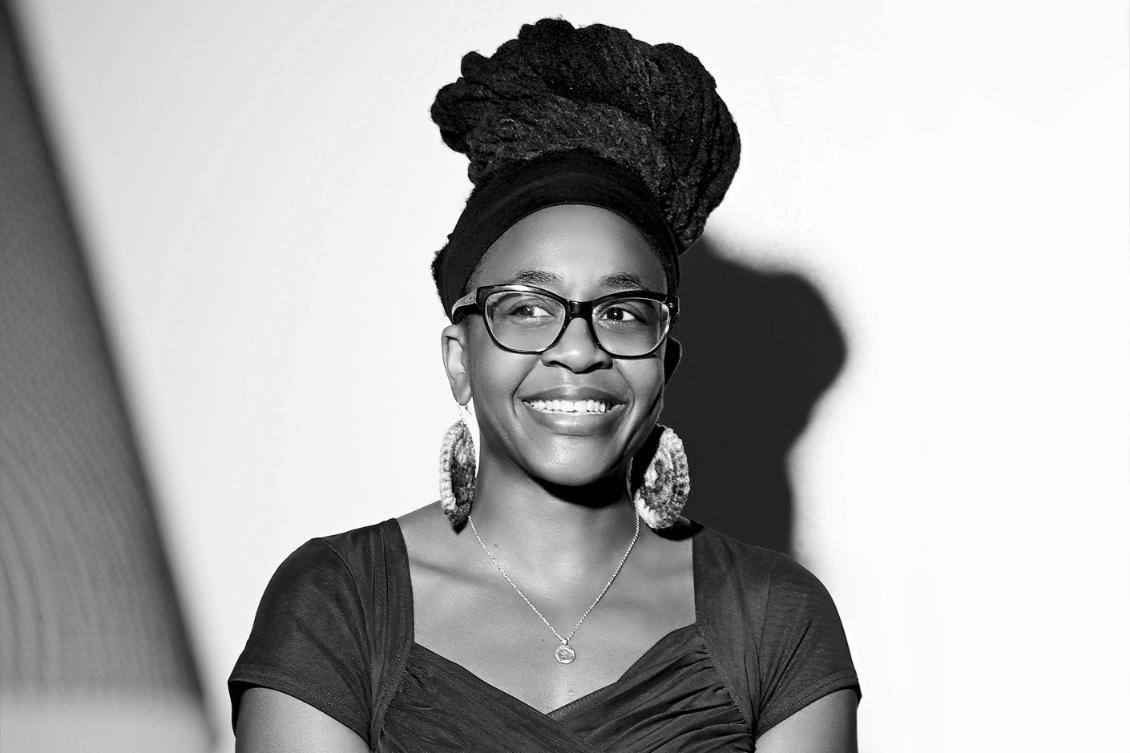
Seattle University community joined the First-Year Academic Engagement team for a day of learning after the Racial Equity Summit to hear from Common Text author, Dr. Nnedi Okorafor. Students, faculty, staff, and alumni attended to hear from our panel of Dr. Saheed Adejumobi (History Dept.), Dr. Yen-Lin Han (Mechanical Engineering Dept.), and Dr. Hilary Hawley (English Dept.) as they discussed themes from Binti and Dr. Okorafor’s latest book, Death of the Author.
Following the event Dr. Okorafor signed attendees' books with Elliot Bay Book Company.
This event was co-sponsored by the African and African American Studies Program, Alumni Engagement, College of Arts and Sciences, College of Science and Engineering, Elliot Bay Book Company, English Department, History Department, Matteo Ricci Institute, Mechanical Engineering Department, Office of Diversity and Inclusion, and Orientation Programs.
Silent Reading: Common Text & Cocoa
Tuesday, October 8, 2024 | 3:30 - 4:30 pm
Wyckoff Reading Room
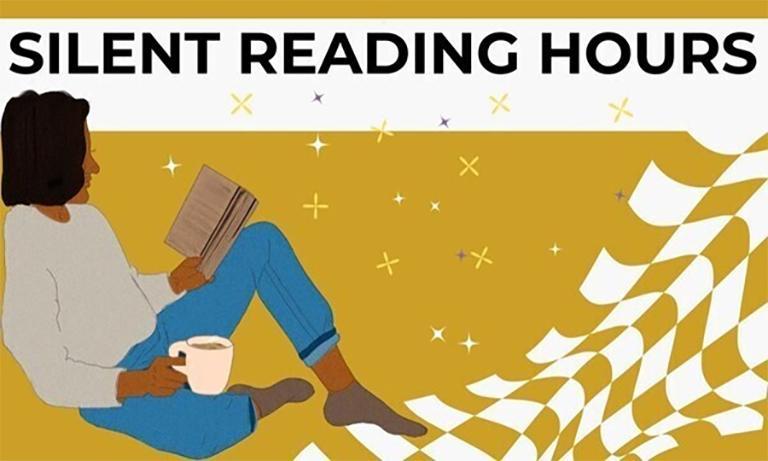
Students and faculty came together every month during the Fall Quarter for a series of silent readings in the Wyckoff Room. We drank cocoa, ate snacks, and read! Copies of Binti were handed out. Sponsored by the Common Text Committee.
All students are welcome to read in the Wyckoff room at any time, but once a month during the Fall Quarter we invite folks in to join us to read together along a theme.
Dr. Nnedi Okorafor's Campus Visit
-
/204x0:3829x2329/prod01/channel_34/media/seattle-university/ucor/the-common-text/past-common-texts/images/Panel-Discussion.png)
From left to right: Dr. Hilary Hawley (English Dept.), Dr. Saheed Adejumobi (History Dept.), Dr. Nnedi Okorafor (author of Binti), and Dr. Yen-Lin Han (Mechanical Engineering Dept.).
-
/0x43:5120x3333/prod01/channel_34/media/seattle-university/ucor/the-common-text/past-common-texts/images/Audience.jpg)
Audience members listening into the panel discussion.
-
/0x229:4541x3147/prod01/channel_34/media/seattle-university/ucor/the-common-text/past-common-texts/images/Robotics-Table.jpg)
Mechanical Engineering student showcasing soft robotics during Dr. Okorafor's campus campus visit.
-
/214x0:5468x3376/prod01/channel_34/media/seattle-university/ucor/the-common-text/past-common-texts/images/Books-on-Table.png)
Dr. Nnedi Okorafor's latest book, Death of the Author, was available for sale from Elliot Bay Book Company.
-
/14x0:5268x3376/prod01/channel_34/media/seattle-university/ucor/the-common-text/past-common-texts/images/Nnedi-Talking-With-Student.png)
Students had the chance to talk with Dr. Nnedi Okorafor during book signing with Elliot Bay Book Company.
-
/0x85:4990x3291/prod01/channel_34/media/seattle-university/ucor/the-common-text/past-common-texts/images/Nnedi-Signing-Book.png)
Dr. Nnedi Okorafor signing books.
2023
Robin Wall Kimmerer's Braiding Sweetgrass is a collection of short and readable essays reflecting on plants and animals as our oldest teachers; it addresses contemporary threats to the environment and ways of knowing that date back millennia and provides guidance on how to adopt an indigenous as well as a scientific framework. It has fueled conversations on our campus about environmental justice, working toward a sustainable future, education, and indigenous ways of knowing.
Robin Wall Kimmerer is a mother, scientist, decorated professor, and enrolled member of the Citizen Potawatomi Nation. She is the author of Braiding Sweetgrass: Indigenous Wisdom, Scientific Knowledge and the Teachings of Plants and Gathering Moss: A Natural and Cultural History of Mosses. She lives in Syracuse, New York, where she is a SUNY Distinguished Teaching Professor of Environmental Biology, and the founder and director of the Center for Native Peoples and the Environment. Learn more about Dr. Kimmerer on her website.
Through the resources below, we invite you to get to know Braiding Sweetgrass and take a deeper dive into the issues raised by Dr. Kimmerer’s book. We hope the accompanying materials offer new perspectives, prompt conversations, and perhaps even inspire action. Please take the time to read, listen, and watch.
Questions for a Resilient Future
We invite you to listen to a talk Dr. Kimmerer gave titled “Questions for a Resilient Future” for the Center for Humans and Nature and the American Museum of Natural History’s Center for Biodiversity and Conservation.
"A Native American Scientist on 'the question of our time'"
Listen to Seattle University’s Dr. Christina Roberts in conversation with Dr. Kimmerer talking about “the question of our time” on KUOW.
Indigenous Peoples of the Pacific Northwest
We respectfully acknowledge that Seattle University resides on the homelands of the Coast Salish peoples, who continue to steward these lands and waters as they have since time immemorial. We pay respect to Coast Salish Elders past and present and extend that respect to their descendants and to all Indigenous people. We recognize tribal nations and organizations who actively create, shape, and contribute to our thriving community at Seattle University and beyond.
Seattle University’s Indigenous People’s Institute has a great collection of local Indigenous resources and spaces.
We invite you to visit some of the museums and cultural centers that focus on Indigenous Peoples.
- Burke Museum of Natural History and Culture
- Daybreak Star Indian Cultural Center
- Duwamish Longhouse and Cultural Center
And on campus, we hope you will visit the Taqwsheblu Vi Hilbert Ethnobotanical Garden.
Center for Indian Law and Policy - Seattle University School of Law
Braided Together at Mission Day
During Seattle University's 2024 Mission Day, Robin Wall Kimmerer, author of Braiding Sweetgrass, helped the university community recenter, reconnect, and reclaim our sense of belonging as collaborators in building a more just and humane world.
-
/0x31:1200x802/prod01/channel_34/media/seattle-university/ucor/the-common-text/past-common-texts/images/Mission-Day-Tent.jpg)
Seattle University's 2024 Mission Day
-
/0x15:1200x786/prod01/channel_34/media/seattle-university/ucor/the-common-text/past-common-texts/images/Jill-La-Pointe-Speaking.jpg)
Jill La Pointe, Senior Director for the Indigenous Peoples Institute at Seattle University, speaking at Mission Day.
-
/0x16:1200x787/prod01/channel_34/media/seattle-university/ucor/the-common-text/past-common-texts/images/Community-Members-in-Audience.jpg)
University community members attending in Pigott Auditorium.
-
/0x15:1200x786/prod01/channel_34/media/seattle-university/ucor/the-common-text/past-common-texts/images/Hilary-Hawley-in-Discussion-with-Robin-Wall-Kimmerer.jpg)
Hilary Hawley, First Year Academic Engagement Director and English Teaching Professor, leading a discussion with Robin Wall Kimmerer, author of Braiding Sweetgrass, in Pigott Auditorium.
-
/0x15:1200x786/prod01/channel_34/media/seattle-university/ucor/the-common-text/past-common-texts/images/Breakout-Session-with-Andrea-Fontana.jpg)
Andrea Fontana, Associate Director of the Center for Jesuit Education at Seattle University, leading a breakout session on campus.
-
/0x15:1200x786/prod01/channel_34/media/seattle-university/ucor/the-common-text/past-common-texts/images/Breakout-Session-at-Centennial-Fountain.jpg)
Breakout session at George Tsutakawa's Centennial Fountain at Seattle University.
2022
In 2022-2023, we engaged with Know My Name by Chanel Miller as a university community. The nation came to know Miller, the survivor of a sexual assault on the Stanford University campus, when she shared her victim impact statement under the pseudonym Emily Doe. In Know My Name, Miller reclaims her identity as a writer, artist, and cultural critic. During the selection process, the Common Text committee noted the theme of resilience in Know My Name:
“It holds the tension of pain and hope, without making the focus on getting through trauma, but rather understanding what it takes to live through it and thrive.”
Chanel Miller shares her story of trauma and healing, and in the process, invites us not only to interrogate the structures that face victims of assault, but to step up and fight alongside her. This is a necessary conversation, not only for Seattle University but for our national culture.
Chanel Miller is a writer and artist. Her memoir Know My Name (2019) has been honored with the National Book Critics Circle Award, the Dayton Literary Peace Prize, the Ridenhour Book Prize, and the California Book Award, in addition to being named a best book of the year by Time, the New York Times Book Review, The Washington Post, Chicago Tribune, NPR, Glamour, Elle, Library Journal, Kirkus, and others. She has also been named one of the Forbes 30 Under 30 and a Glamour Woman of the Year under her pseudonym Emily Doe.
In addition to her work’s connections to creative writing and the arts, her recounting of her experience preparing for trial can also inspire conversations in disciplines including nursing and the health sciences, women and gender studies, forensics and criminal justice, psychology, and law. Chanel’s identity as a Chinese-American woman with an immigrant parent connects to both 2021’s Common Text, Jose Antonio Vargas’s Dear America, as well as to recent events surrounding COVID-19 and violence against the Asian American community.
Through the resources below, we invite you to get to know Chanel Miller through her art and take a deeper dive into the issues raised by her book.
I Am With You
I Am With You is a short film featuring Chanel Miller’s art that she created to accompany Know My Name. We invite you to view it to get to know Chanel as a whole person. Chanel writes:
“While writing Know My Name, I was constantly drawing as a way of letting my mind breathe, reminding myself that life is playful and imaginative. We all deserve a chance to define ourselves, shape our identities, and tell our stories. The film crew that worked on this piece was almost all women. Feeling their support and creating together was immensely healing. We should all be creating space for survivors to speak their truths and express themselves freely. When society nourishes instead of blames, books are written, art is made, and the world is a little better for it.”
Me Too
The "me too." movement was founded by Tarana Burke. Read about the history of the movement and its vision. The site’s Survivor’s Sanctuary is a self-guided digital healing platform with 36 lessons created by Black, Indigenous, and brown practitioners ranging in depth from 5 to 25 minutes and modules exploring creating affirmation practices, breathing exercises, and compassionate self-touch that welcomes survivors to begin or continue their healing journeys wherever they are.
We invite students to read Mueller et al.’s article on “Demographic Representation and Collective Storytelling in the Me-Too Twitter Hashtag Activism Movement”. One of the values of Seattle University is to foster a concern for justice and the competence to promote it. We acknowledge that even though #MeToo is rooted in building a supportive network for communities of color affected by sexual violence and other systemic issues, white authors and narratives shaped by whiteness overly represent the hash tag. As such, we as a community need to address the implications and ways we can raise up underrepresented voices and their stories.
“I Was, I Am, I Will Be” Exhibition at the Asian Art Museum
- Watch Chanel Miller speak about her exhibition at the Asian Art Museum in San Francisco.
- View the exhibit.
- Read about it in the New York Times.
MISSING AND MURDERED INDIGENOUS WOMEN, GIRLS, AND TWO-SPIRIT PEOPLE
According to the Global Indigenous Council’s MMIW Campaign, for more than a decade, the US Department of Justice has estimated that Native American women are around 2.5 times more likely to be victims of sexual assault when compared to the general population. One in three Native women will be raped in their lifetimes. Canadian First Nations women are six times more likely to be the victims of homicide, and it is ten times more likely for U.S. Native women.
Native Justice’s MMIWG2S (Missing and Murdered Indigenous Women, Girls, and Two-Spirit People) Program was started in August 2019. Learn more about the program.
On campus, we hope you will connect with the Indigenous Peoples Institute which supports Native American student success at Seattle University and raises awareness about issues of critical importance to local and global Indigenous peoples.
Be the Swede
“I always like to say, ‘be the Swede.’ Show up for the vulnerable, do your part, help each other and face the darkest parts alongside survivors,” Chanel Miller writes in Know My Name.
In this clip from 60 Minutes, Chanel Miller speaks about the men who intervened in her sexual assault and what it was like to meet them in person.
In Courage a short, illustrated film, Chanel explores and reflects on finding courage.
All enrolled students have access to TimelyCare, a 24/7 medical and mental telehealth resource.
Here are a number of national and local sexual assault resources:
- King County Sexual Assault Resource Center (24/7): 888-998-6423
- Victim Support Services: 425-252-6081
- Harborview Abuse and Trauma Center (24/7): 206-744-1600
- National Sexual Assault Hotline: 800-656-4673
- National Domestic Violence Hotline (24/7): 800-799-SAFE
- Crisis Connections (24/7): 866-427-4747
- Crisis Text Line (24/7): Text HOME to 741741
- Suicide Prevention Lifeline (24/7): 988
Content Warning: Sexual Assault
We understand that Miller’s personal and unflinching account of her experience and recovery may be difficult for some readers. Please put your own wellness first, and please reach out to family, friends and your support system.
Chanel Miller in Conversation
At Seattle University's 2022 New Student Convocation, Chanel Miller, author of Know My Name, joined the university community for a virtual conversation about her art and writing.
-
/0x14:1130x740/prod01/channel_34/media/seattle-university/ucor/the-common-text/past-common-texts/images/Chanel-Miller-on-Screen-1130X754.jpg)
Chanel Miller on screen.
-
/0x14:1130x740/prod01/channel_34/media/seattle-university/ucor/the-common-text/past-common-texts/images/Asking-Questions-1130X754.jpg)
University community members asking Chanel Miller questions.
-
/0x14:1130x740/prod01/channel_34/media/seattle-university/ucor/the-common-text/past-common-texts/images/Students-in-Audience-1130X754.jpg)
Students attending New Student Convocation.
-
/0x14:1130x740/prod01/channel_34/media/seattle-university/ucor/the-common-text/past-common-texts/images/Hilary-Hawley-Speaking-1130X754.jpg)
Hilary Hawley, First Year Academic Engagement Director and English Teaching Professor, speaking at New Student Convocation.
-
/0x14:1130x740/prod01/channel_34/media/seattle-university/ucor/the-common-text/past-common-texts/images/Students-Sitting-Together-1130X753.jpg)
Students sitting together at New Student Convocation.
2021
In 2019, incoming students read Ijeoma Oluo’s book So You Want to Talk About Race. In Fall 2020, students engaged with a suite of digital readings to help us to further understand this historic moment, where renewed calls for racial justice and the protection of Black lives were happening in the midst of a global pandemic. They also anticipated the conversation we will begin this Fall on the meaning of U.S. citizenship, starting with Jose Antonio Vargas’s book, Dear America.
Jose Antonio Vargas is a Pulitzer Prize-winning journalist, documentary filmmaker, and one of the founders of the nonprofit media and culture organization, Define American. He was born in the Philippines and immigrated to the United States at the age of 12. At 16, when he went to apply for a driver's permit, he learned that his grandparents had brought him to the U.S. using fake papers. Dear America is a memoir tells the story of that discovery, how he navigated systems of employment and government, of the family he built along the way, and what happened when, in 2011, he publicly declared his status as an undocumented citizen.
But, he says:
"this is not a book about the politics of immigration... This book is about homelessness, not in a traditional sense, but the unsettled, unmoored, psychological state that undocumented immigrants like me find ourselves in... After twenty-five years of living illegally in a country that does not consider me one of its own, this book is the closest thing I have to freedom" (Dear America, xiii).
To help you get started, we have provided some background on recent immigration policy and the situation at the southern border of the United States. A brief article and short videos from Define American will demonstrate the range of immigrant experience, documented and undocumented. Finally, Jose Antonio Vargas invites us to consider three questions on citizenship in his 2020 TED Talk.
We hope these texts offer new perspectives, prompt difficult but necessary conversations, and perhaps even inspire action. Please take the time to read, listen, and watch.
"All Presidents Are Deporters in Chief"
This opinion essay from the editors of the New York Times discusses the responsibility of any president to manage the nation's borders, explains the approaches to deportation, and measures each president's approach over the last four presidencies.
"9 questions about the humanitarian crisis on the border, answered"
Nicole Narea explains the forces behind migration from Central America, how recent administrations have tried to prevent it, and what happens once migrants present themselves at our southern border.
Undocumented and Black
Ainslya Charlton graduated from Trinity College in Connecticut in 2016 with a bachelor's degree in political science and human rights. Her story as a black undocumented student further shatters the perception that immigration reform is only a Latino issue.
Stories - Define American
Define American is a culture change organization that uses the power of narrative to humanize conversations about immigrants. Choose a few of these very brief (1-2 minute) videos to hear the stories uploaded by undocumented people from around the country.
3 questions to ask yourself about US citizenship
Jose Antonio Vargas has three questions in this TED Talk: Where did you come from? How did you get here? Who paid?
Voices of the Border
A Conversation with Dr. Tobin Hansen and Maria Engracia Robles Robles, ME
Tuesday, October 19, 2021 | 6:30 p.m.
Pigott Auditorium
Migrants, refugees, and deportees live through harrowing situations, yet their personal stories are often ignored. While politicians and commentators mischaracterize and demonize, herald border crises, and speculate about who people are and how they live, the actual memories of migrants are rarely shared. In the tradition of oral storytelling, Voices of the Border reproduces the stories migrants have told and in doing so offers a window onto both individual and shared experiences of crossing the US–Mexico border.
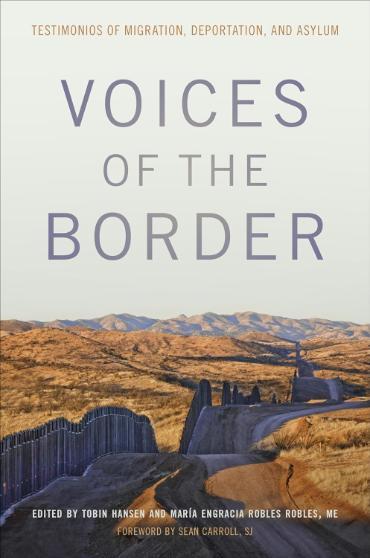
Back to Top
2020 Digital Readings
Allegories on race and racism
TEDx Talk by Camara Jones
"Is 'Race Science' Making a Comeback?"
By Jess Kung, Gene Demby, Shereen Marisol Meraji
Implicit Bias, Stereotype Threat and Higher Ed
TEDx Talk by Russell McClain
"What is Owed"
By Nikole Hannah-Jones
"Racism, the Immigration Enforcement Regime, and the Implications for Racial Inequality in the Lives of Undocumented Young Adults"
By Elizabeth Aranda and Elizabeth Vaquera
"The Police Killings No One Is Talking About"
By Stephanie Woodard
"The Model Minority Trap."
By Viet Thanh Nguyen
"Facing Racism."
By Anna Purna Kambhampaty and Sangsuk Sylvia Kang
"Examining Racial Disparities Observed During Coronavirus Pandemic"
By Rachel Martin
"This is what an antiracist America would look like. How do we get there?"
By Ibram X. Kendi
Racism, Immigration and Ally-ship
Jose Antonio Vargas interview with Karen Hunter and Drew McCaskill
As the 2019-2020 academic year came to a close at Seattle University, we saw protests against racial injustice across America in response to the killings of George Floyd, Breonna Taylor, and Ahmaud Arbery. We stand with Seattle University president, Fr. Stephen Sundborg, and Chief Diversity Officer, Dr. Natasha Martin in condemnation of these acts and in calling for continued work to end systemic injustice.
One of the goals of the Common Text program is to invite students into a conversation, one that will continue throughout the year, and beyond. We encourage our students and our community to remain in dialogue with the themes of this year’s text, So You Want To Talk About Race. Below are some resources for continued learning and engagement.
"We Want to Talk About Race"
Ijeoma Oluo speaks about the protests in response to the murder of George Floyd.
"The American Nightmare"
Ibram X. Kendi, author, professor, and the director of The Antiracist Research and Policy Center at American University reflects on historical and current anti-black racism.
Public Address On Revolution: Revolution Now | Rachel Cargle
A starting point for finding your place in the revolution, using a three-pronged approach of Knowledge, Empathy, and Action.
Summer Inclusive Excellence Reading Lists
Seattle University's Office of Diversity and Inclusion puts together annual summer reading lists meant to foster our ongoing conversation around diversity, equity, and inclusion.
Seattle Public Library's Toolkit for Anti-racism Allies
As a Seattle University student, you have access to Seattle Public Library resources. This list contains ebooks, downloadable audiobooks, and streaming videos.
"Seeing White"
A fourteen-part documentary series examining the notion of whiteness.
The New York Times' 1619 Audio-series
This audio series, hosted by Nikole Hannah-Jones, is part of The 1619 Project, a major initiative from the Times observing the 400th anniversary of the beginning of American slavery.
Beyond 13th
Alternatives to Incarceration, Systemic Reform, and Restoration of Rights
Thursday, April 22, 2021 | 12:30 - 1:30 p.m.
Zoom Webinar
How do we address the racial disparities in Washington's criminal justice system? What are the economic, political, and personal impacts on incarcerated people and what alternatives to incarceration exist? A panel of Seattle University faculty, undergraduate students, and alumnus explored these topics and more.
- Robert Chang, Professor of Law and Executive Director, Fred T. Korematsu Center for Law and Equity
- Brooke Gialopsos, Assistant Professor, Criminal Justice
- Rev. Martin I. Lawson, Director, Community Safety Initiative, Community Passageways
- Abem Fekade-Tessema, student, Business Economics
- Sarah Trapizona, student, Political Science
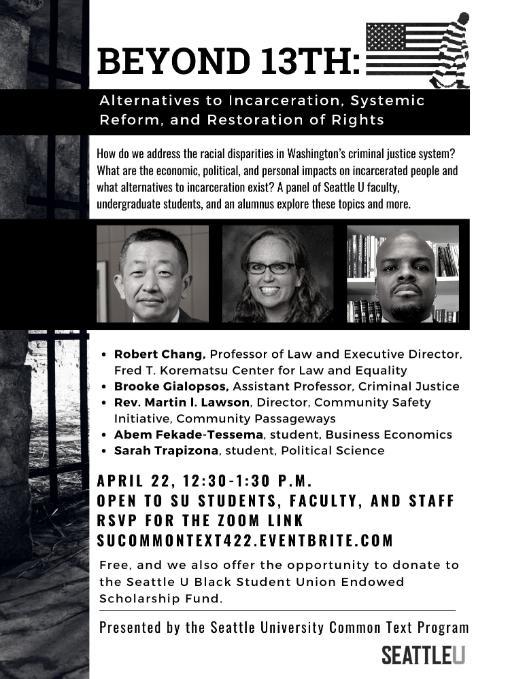
2019
Check out these additional resources regarding Ijeoma Oluo’s So You Want to Talk About Race and issues of racism, oppression and marginalization. Here you will find more by Oluo, as well as resources for some in-depth exploration of Redlining - one of the subtle but impactful ways that institutionalized racism has impacted our communities, including right in SU’s neighborhood.
Ijeoma Oluo Talks at Google
"I Don't Feel Like Celebrating"
"Confronting racism is not about the needs and feelings of white people"
Redlining
During the Great Depression of the 1930s, many U.S. residents could not afford access to a home. To spur home ownership, President Franklin Delano Roosevelt's administration, under the New Deal, started the Federal Housing Administration to support homeowners with federally backed mortgages.
However, banks that gave out mortgage did so along racial lines. In more than 200 U.S. cities, bank drew race-based maps to determine loans: white neighborhoods were marked in green or blue as "desirable," where nonwhite areas were marked in yellow or red for "hazardous." White residents received mortgages with the best interest rates, where black residents, and/or those who lived in non-white areas, were denied loans or given the worst rates. This became the process of redlining, which denied loans to and divested from black areas, while guaranteeing loans to and investing in white areas across the United States. Redlining, the federally backed loan process, created the racially segregated cities that exist today.
The Disturbing History of the Suburbs
Segregated Seattle
Dynamic, archival resource on restrictive covenants, a precursor to redlining.
Mapping Inequality
A dynamic map overlaying 1930s redlining maps with current U.S. maps.
The Color of Law, Richard Rothstein (2017)
Conversations in the Commons (Winter Quarter 2020)
Session 1: Let's Talk About Our Whiteness
Thursday, January 23, 2020 | 12:30 - 1:15 p.m.
LEML 366, 3rd floor Lemieux Library and McGoldrick Learning Commons
Session 2: When Hate Speech and Free Speech Collide
Thursday, February 20, 2020 | 12:30 - 1:15 p.m.
LEML 366, 3rd floor Lemieux Library and McGoldrick Learning Commons
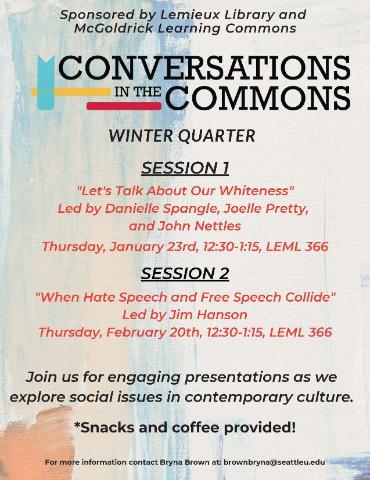
OMA Speaks: So You Want to Talk About Race?
Students of Color Edition
Thursday, November 21, 2019 | 12:30 - 1:20 p.m.
OMA Living Room (PAVL 180)
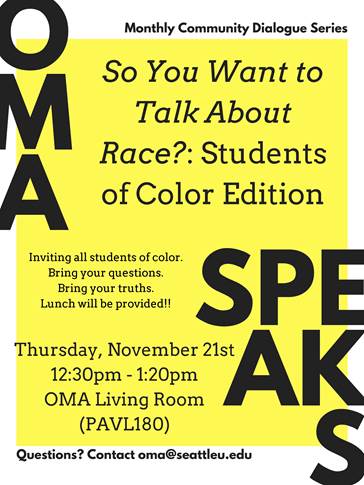
Conversations in the Commons (Fall Quarter 2019)
So You Want to Talk About Race
Thursday, October 17, 2019 | 12:30 - 1:30 p.m.
LEML 369, 3rd floor Lemieux Library and McGoldrick Learning Commons
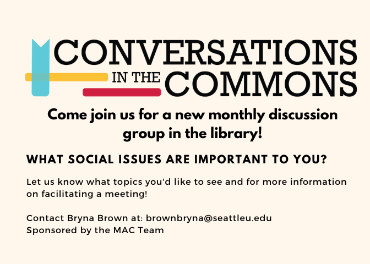
An Evening with Ijeoma Oluo
Tuesday, October 15, 2019 | 5:30 - 6:30 p.m.
Pigott Auditorium
